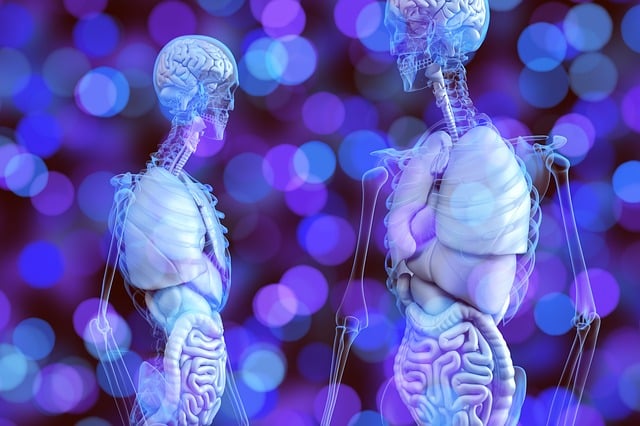The Endocannabinoid System (ECS) is a complex network that regulates appetite, digestion, and metabolism, maintaining body balance. Cannabinoids in cannabis interact with ECS receptors, influencing hunger and digestive processes. This interaction offers insights into treating eating disorders and managing gastrointestinal conditions. Disruptions in the ECS may contribute to metabolic disorders like obesity and type 2 diabetes. Understanding the ECS's role in food intake, satiety, and gut health is crucial for developing novel therapeutic strategies and personalized nutrition plans. Future research should explore genomics, AI, and the gut-brain axis to enhance ECS-focused treatments and prevent long-term effects of cannabis consumption.
The endocannabinoid system (ECS) plays a pivotal role in regulating appetite and digestion, two fundamental processes influencing overall health. This intricate system modulates hunger and satiety signals, ensuring balanced nutrition intake. Our article delves into the science behind the ECS, exploring how cannabinoids interact with the brain and body to control hunger. We examine the impact on gastrointestinal functions, the potential therapeutic uses for eating disorders, and safety considerations. Understanding the endocannabinoid system provides insights into innovative treatment approaches and highlights areas demanding further research in appetite and digestion studies.
The Role of the Endocannabinoid System in Appetite Regulation

The Endocannabinoid System (ECS) plays a pivotal role in regulating appetite, a complex process involving interactions between various hormones and neural signals. This intricate system is designed to maintain homeostasis within the body, including balancing energy intake and expenditure. ECS receptors are present in key areas of hunger and satiety control, such as the brain’s hypothalamus. When activated, these receptors initiate a cascade of events leading to feelings of hunger or fullness, influencing food intake and energy metabolism.
Understanding the ECS is crucial when exploring appetite regulation. The system’s endocannabinoids, like anandamide and 2-AG, act as lipophilic neurotransmitters, binding to specific receptors to modulate various physiological processes. In the context of appetite, they can suppress hunger signals, promoting feelings of satiety. This dynamic interplay ensures that food intake is finely tuned to the body’s energy needs, making the ECS a key player in maintaining optimal weight and overall metabolic health.
How Cannabinoids Impact Hunger and Satiety Signals

Cannabinoids, like those found in cannabis, have a profound effect on our appetite and digestion by interacting with the body’s own endocannabinoid system (ECS). The ECS is a complex network of receptors located throughout the brain and body that play a key role in regulating various physiological processes, including hunger and satiety. When cannabinoids bind to these receptors, they can modify the transmission of signals that control appetite, potentially leading to increased or decreased hunger.
This interaction isn’t limited to the immediate sensation of hunger; cannabinoids also influence digestion by slowing gastric emptying, which can enhance feelings of fullness. This effect is thought to be mediated through the ECS’s ability to modulate neurotransmitters and neuropeptides involved in satiety signaling. Understanding this intricate relationship between cannabinoids and the ECS offers valuable insights into potential treatments for conditions characterized by altered appetite or digestion, such as anorexia or obesity.
Understanding the Digestion Process: An Overview

The digestion process is a complex, multi-step system that involves breaking down food into smaller components for energy and nutrient absorption. It begins in the mouth with mechanical chewing and enzymatic breakdown by saliva. The partially digested food then travels to the stomach, where strong acids and enzymes continue the process. From there, it moves into the small intestine, the primary site of nutrient absorption, where bile from the liver and pancreatic enzymes further break down food particles. This intricate journey ensures that macromolecules like proteins, carbohydrates, and fats are broken down into manageable units for the body to utilize.
Understanding this process is crucial, especially in light of emerging research on the endocannabinoid system (ECS). The ECS plays a significant role in regulating appetite, digestion, and metabolism. It maintains homeostasis—the body’s internal balance—by modulating various physiological functions, including food intake, nutrient transport, and waste elimination. By interacting with endocannabinoids produced by our bodies, dietary components can influence hunger cues, satiety signals, and overall digestive health, highlighting the complex interplay between nutrition, digestion, and our endogenously produced chemical messengers.
Effects of Cannabis on Gastrointestinal Functions

Cannabis has been shown to significantly impact gastrointestinal functions, offering a complex interplay with the body’s endogenous systems, particularly the endocannabinoid system (ECS). The ECS is a vast network of receptors and molecules that play a crucial role in maintaining homeostasis within various physiological processes, including digestion. Understanding the ECS is key to comprehending how cannabis affects the gut. When cannabis compounds, such as tetrahydrocannabinol (THC) and cannabidiol (CBD), interact with the ECS, they can modulate gastric emptying, intestinal motility, and the sensation of hunger—all of which are essential for proper digestion.
Research suggests that THC may stimulate the release of gastrointestinal hormones, influencing food intake and digestion. On the other hand, CBD has been linked to anti-inflammatory properties, potentially soothing digestive distress and reducing symptoms in conditions like irritable bowel syndrome (IBS). This dual action highlights the complex nature of cannabis’s effects on the gut, providing both challenges and potential therapeutic benefits for those with gastrointestinal disorders.
The Science Behind Cannabis Appetite Stimulation

The human body’s appetite and digestion are intricately linked to the complex Endocannabinoid System (ECS). This system plays a pivotal role in regulating various physiological processes, including food intake and the sensation of hunger. When we consume cannabis, compounds like THC interact with our ECS, leading to stimulatory effects on appetite. The science behind this phenomenon is both fascinating and intricate.
THC binds to specific receptors within the ECS, particularly CB1 receptors located in the brain and gut. This binding triggers a cascade of events, enhancing the activity of these receptors and influencing the release of neurotransmitters that control hunger. As a result, individuals may experience increased appetite, often referred to as “the munchies.” Understanding the ECS and its interaction with cannabis compounds offers valuable insights into the complex relationship between diet, digestion, and overall well-being.
Exploring the Link Between Endocannabinoids and Metabolic Disorders

The Endocannabinoid System (ECS) is a complex physiological system that plays a pivotal role in maintaining homeostasis, or balance, within the body. It’s involved in various processes, including appetite regulation and digestion. Understanding the ECS is crucial when exploring its potential connection to metabolic disorders. This system acts as a sort of ‘internal communication network’, using endocannabinoids (naturally occurring compounds) to send signals between cells. One of its key functions is to modulate energy balance by controlling food intake and energy expenditure.
Research suggests that disruptions in the ECS may contribute to the development of metabolic disorders, such as obesity and type 2 diabetes. Endocannabinoids influence hunger and satiety through interactions with specific receptors in the brain and gut. Imbalances in this system could potentially lead to excessive appetite and altered metabolism, increasing the risk of metabolic diseases. By understanding these intricate relationships, scientists can uncover new pathways for potential treatments and interventions aimed at addressing metabolic health issues.
Therapeutic Potential: Treating Eating Disorders with the Endocannabinoid System

The endocannabinoid system (ECS) has emerged as a promising target for treating eating disorders, such as anorexia nervosa and obesity. This complex physiological system plays a crucial role in regulating appetite, food intake, and energy balance. By understanding the ECS’s intricate network of receptors and endogenous compounds, researchers can develop novel therapeutic strategies to address the underlying causes of eating disorders.
Activation of specific ECS receptors has shown potential in modulating eating behaviors. For example, certain endocannabinoids can stimulate appetite and promote food seeking, while others may have the opposite effect. Targeted interventions that manipulate the ECS could offer a more personalized approach to treating eating disorders, addressing the individual variations in appetite regulation. This innovative approach holds great promise for improving patient outcomes and quality of life.
Safety Considerations: Short-term and Long-term Effects of Cannabinoid Consumption

When discussing appetite and digestion, it’s crucial to understand the role of the endocannabinoid system (ECS), a complex biological system that regulates various physiological processes, including hunger and metabolism. Cannabinoids, compounds found in cannabis, interact with the ECS by binding to receptors present in the brain and body. This interaction can lead to both short-term and long-term effects on appetite and digestion.
Short-term consumption may result in increased appetite due to cannabinoids’ ability to stimulate certain receptors associated with hunger. However, excessive or prolonged use could have adverse effects, such as gastrointestinal distress and changes in metabolism. Long-term effects are still being studied, but evidence suggests potential risks including dependency, cognitive impairment, and altered hormone regulation. Understanding these safety considerations is essential for responsible cannabis use, especially considering its growing popularity in medical and recreational settings.
Future Research Directions in Appetite and Digestion Studies

As we continue to unravel the complexities of appetite and digestion, future research should focus on deeper explorations within the endocannabinoid system (ECS). Unlocking the intricate interplay between ECS compounds like cannabinoids, endocannabinoids, and receptors could provide novel insights into regulating food intake and digestive processes. Understanding how these molecules influence hunger signals, satiety, and overall gastrointestinal health holds immense potential for developing innovative therapeutic interventions.
Additionally, integrating advanced technologies such as genomics and artificial intelligence can significantly enhance our understanding of individual variations in appetite and digestion. These approaches may enable personalized nutrition plans and predictive models for metabolic disorders. Future studies should also explore the gut-brain axis, examining how the microbiome interacts with the ECS to modulate eating behaviors and digestive responses, ultimately paving the way for more effective treatments for conditions like obesity and gastrointestinal diseases.
